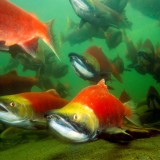Note well the names that follow, for they are British Columbia MPs who voted for the final destruction of the Pacific Salmon, the sea going Rainbow trout (Steelhead), river resident Cutthroat, resident Rainbow trout, river dwelling Dolly Varden and Bull trout:
Don Albas, Ron Cannan, John Duncan, Ed Fast, Kerrry-Lynne Findlay, Nina Grewal, Richard Harris, Russ Heibert, Randy Kamp, James Lunney, Colin Mayes, Cathy McLeod, James Moore, Andrew Saxton, Mark Strahl, Mark Warawa, John Weston, David Wilks, Alice Wong, Wai Young, and Bob Zimmer.
These toadies are our Conservative Members of Parliament, the blind followers of ultra-conservative Stephen Harper. They voted for Bill C-38, which in itself was a gross abdication of democracy in that it was an act to amend the Budget Act, yet included in it critical amendments to the Fisheries Act and many other environmental protections, making it all but a slam dunk for developers to ravage salmon habitat.
These lickspittles uttered not a word of objection (except Wilks, when caught on candid camera, before promptly recanting) that Harper abused an omnibus bill in order to restrict debate on amendments to the Fisheries Act, then proceeded to vote for it.
The Conservative Party under Brian Mulroney and Stephen Harper started their war on our salmon back in the 1980s when they muzzled Fisheries and Oceans (DFO) scientists over the Alcan plan to lower the Nechako River, near Prince George, to dangerous levels, thus threatening runs of sockeye salmon en route to their spawning grounds. The danger came in summertime, when excessive heat would meet low waters – a certainty which then-Fisheries Minister Tom Siddon called “an acceptable risk”. DFO scientists had studied Alcan’s plans and vigorously opposed them and one by one they were moved sidewise, given early retirement or forced by their own code of honour to remove themselves.
The government passed an order-in-council forbidding the usual environmental assessment process, clearly knowing that it would have to call these scientists to give evidence, thus exposing the Kemano Completion program for what it was – naked aggression against the salmon.
Along the way, the DFO, mandated to protect the fish, was instructed to support Atlantic salmon fish farms on the west coast, driving another nail into the coffin of our sacred signature salmon. DFO, unable to enforce the act while supporting the presence of fish farms chose, under stern political guidance, to avoid enforcement of their mandate to protect west coast salmon. Now they have virtually no power to restrain any development. They are eunuchs.
Here’s how the Sudbury Star put it:
Bill C-38 does a lot more than simply implement the federal budget. It eviscerates many of Canada’s historic environmental laws, and establishes a new regime that promotes unrestrained economic development at the expense of environmental protection. For starters, Bill C-38 will repeal the Canadian Environmental Assessment Act, one of the foundational pieces of legislation, which for decades has required an assessment of impacts when development is proposed. In place of the Act, the Conservatives are offering new legislation that will severely restrict the required assessment of environmental impacts, and limit opportunities for input from the public and First Nations.
The Fisheries Act will also be gutted by the omnibus bill, as fish habitat protections will be removed. Tom Siddon, the former Tory minister of Fisheries and Oceans in Brian Mulroney’s government, expressed his outrage over this regressive step to managing the economically important fisheries resource.
Why would the government want to gut the Fisheries Act?
Anyone in mind who might like these changes?
Here’s what Postmedia reports:
Federal fisheries officials were having “troubling” disagreements with Enbridge Inc. over the company’s interpretation of its responsibility to protect fish habitat along the Northern Gateway oilsands pipeline route before the company submitted its project proposal in 2010, according to internal documents.
Enbridge was concluding some of the crossings, over an estimated 1,000 waterways, were low risk when fisheries biologists felt the same were medium or high risk to fish and fish habitat, according to emails obtained through the Access to Information Act.
Here’s what The Northern View wrote, reporting on Prince Rupert Council’s opposition to C-38:
Bill C-38 also includes the changes to the Environmental Assessment system for big industrial projects, and the provision that gives the federal cabinet final say over decisions made by the National Energy Board. This change has lead to a considerable loss of confidence in the Enbridge Joint Review Panel hearings by local Northern Gateway opponents, who, at the last hearing in Prince Rupert, repeatedly accused the panel of being stripped of credibility and authority.
Many, including me, have been making the point for years that under our system, Members of Parliament do not represent their constituencies but, instead, return to their ridings to tell us what Ottawa is doing to us and that we can like it or lump it.
I understand, from personal experience, how hard it is for an individual to disagree with the leader and do so publicly. But surely a time comes when the leader is so egregiously in contempt of an MP’s interests that he/she must lay it on the line, knowing it will be politically fatal. If this is not the case, what the hell do we need the MP for anyway? Is their only role to do what they’re told and check it out when a constituent’s pension cheque is late?
One of the consequences of this tight discipline is that the MP no longer informs him/herself of contentious issues. I spoke with my Tory MP, John Weston, a couple of weeks ago and it was obvious that he knew dick-all about the pipelines issue, to add to his utter ignorance of the private power (IPPs) issue. Why learn the other side when you’re going to vote as you are told? What’s the point of cluttering one’s mind with facts when they don’t count for a damn thing when you come to vote?
The system stinks but it will survive as long as the government has absolute control over government members. Here we have the proof – every single BC Conservative MP voted in favour of further decimating our Pacific salmon and their cousins.
For shame! On our Tory MPs for not standing up for their province and on all of us for not understanding how our dishonest system fails us, thus not doing anything to force a change.






